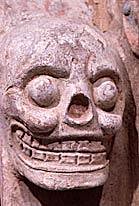 The Popol Vuh, "Mayan Book of the Dawn of Life," is also a book of death. For it is at best the record of an absence. Its anonymous authors tell us at the outset that they are writing the history and myth of the Quiché people precisely because
The Popol Vuh, "Mayan Book of the Dawn of Life," is also a book of death. For it is at best the record of an absence. Its anonymous authors tell us at the outset that they are writing the history and myth of the Quiché people precisely becausethere is no longerThey conclude in similar vein:
a place to see it, a Council Book,
a place to see "The Light that Came from Beside the Sea,"
the account of "Our Place in the Shadows,"
a place to see "The Dawn of Life." (63)
This is enough about the Being of Quiché, given that there is no longer a place to see it. There is the original book and ancient writing owned by the lords, now lost. (198)The Popol Vuh itself, then, can only supplement or stand in for a lost or inaccessible text, a missing plenitude irrecoverable in the wake of Spanish conquest. Hence the ambivalence of the book's final lines, which assert either that this substitution has been successful in recapturing the lost history that it retells, or that the supplement can be no more than an epitaph to an independent existence now irredeemably extinguished: "everything has been completed here concerning Quiché, which is now named Santa Cruz" (198).
Something of this impossibility inheres in all subaltern texts: they recognize that the power of naming (a power continually underscored within the pages of the Popol Vuh) escapes their grasp. At best, the subaltern can hope to insinuate him or herself within the codes established by the dominant, perhaps to upset or relativize that discourse of power, at least slightly. At best, the subaltern aims at a precarious reinscription within or between the terms structuring the new doxa.
 At the same time, with the Popol Vuh--and the same goes for the Incas with both Garcilaso de la Vega's Comentarios reales and Guaman Poma's Primer Nueva Corónica--there are very definite limits to the sympathy such a text can incite. For what it laments is not the fact of domination per se, but simply its relocation. These books lament the destitution of indigenous sovereignty, but above all they also mourn the fate of a native aristocracy usurped.
At the same time, with the Popol Vuh--and the same goes for the Incas with both Garcilaso de la Vega's Comentarios reales and Guaman Poma's Primer Nueva Corónica--there are very definite limits to the sympathy such a text can incite. For what it laments is not the fact of domination per se, but simply its relocation. These books lament the destitution of indigenous sovereignty, but above all they also mourn the fate of a native aristocracy usurped. The Popol Vuh is a genealogy of the Quiché state, a record of its noble houses and lordships, and a celebration of its (former) power to exact tribute from surrounding tribes:
What they did was no small feat, and the tribes they conquered were not few in number. The tribute of Quiché came from many tribal divisions.The last lords in the list have Spanish names: Don Juan de Rojas and Don Juan Cortés. They themselves now pay tribute to the Spanish, rather than receiving it from their fellow indigenous people. Like many native aristocrats, however, Juan de Rojas and Juan Cortés sought accommodation with the Spaniards, hoping to maintain their rights to local domination under the aegis of European imperialism. And, as translator and editor Dennis Tedlock notes, the Popol Vuh itself may well have been a crucial implement in the case that the local lords made as they tried to establish dialogue with their new masters:
And the lords had undergone pain and withstood it; their rise to splendor had not been sudden. Actually it was Plumed Serpent who was the root of the greatness of the lordship.
Such was the beginning of the rise and growth of Quiché.
And now we shall list the generations of lords, and we shall also name the names of all these lords. (194)
Juan Cortés, whose duties as Keeper of the Reception House Mat would have included tribute collection had he served before the coming of [conquistador] Alvarado, worked constantly to restore tribute rights to the lordly lineages of the town of Quiché. In 1557 he went all the way to Spain to press his case, and it could be that he took a copy of the alphabetic Popol Vuh with him. (56)Interestingly, the subjugated tribes are described twice as a multitude, at least as they are ventriloquized by the scribal aristocrats of their subjugators: "Don't we constitute a multitude of people?" (166); "Aren't we a multitude?" (169).
The real absence, then, is surely not the defeated state nobility whose destruction these texts bemoan; it is rather the constituent power that they themselves repress, in a form of anticipatory counter-insurgency.
But what can we say of constituent power in pre-Columbian societies, when constituted power has so thoroughly mystified its origins in the few texts that are available to us?
No comments:
Post a Comment